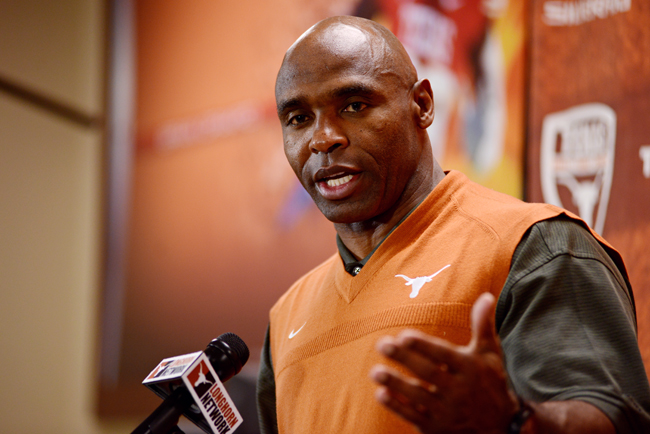Just days after Charlie Strong was introduced as the University’s new head football coach, booster Red McCombs took to the airwaves to voice his thoughts on the new hire. In an interview with ESPN 1250 San Antonio, McCombs, a former owner of the San Antonio Spurs, Denver Nuggets and Minnesota Vikings, described the University’s decision as a “kick in the face.”
“I don’t have any doubt that Charlie is a fine coach. I think he would make a great position coach, maybe a coordinator. But I don’t believe [he belongs at] what should be one of the three most powerful university programs in the world right now at UT-Austin,” McCombs added.
McCombs’ comments came off as insensitive, pompous and racist given that he reacted so strongly to the hiring of Strong, the University’s first African-American men’s head coach and only the second African-American head coach in school history. To say that Strong isn’t the right man for the job is one thing, but to dismiss his accomplishments as only warranting a position coach or coordinating job is downright degrading.
Bryan Davis, a government senior and president of the Society for Cultural Unity, felt McCombs’ remarks were “subjective, personal and rooted in something other than football commentary.”
Kevin Cokley, a professor of educational psychology and of African and African diaspora studies, added, “I think Strong will probably be scrutinized even more closely than perhaps a white coach, in part to see how he deals with the influential big-money boosters who are part of the ‘white Texas good ole boy’ club. Also, given the negative stereotypes that exist about African-American intelligence I would not be surprised if some critics start questioning his play calling and his decision making to a greater degree than occurred with Mack Brown.”
Even though McCombs is the only booster who has publicly spoken out against Strong, it is an indication of the uphill battle to come, especially when considering the fate of the University’s last and only other African-American head coach, Bev Kearney.
Kearney, who filed a $1 million lawsuit against the University, claims she was fired for having a consensual relationship with a student-athlete, while other UT white male employees in similar relationships — particularly Major Applewhite — did not face equal disciplinary action.
The University has failed to clearly illustrate why Kearney was fired while Applewhite merely received a pay cut for committing the same offense. So it seems as if race and gender play a bigger role in the case than the University is letting on.
Though the University has only had two African-American head coaches, it is important to note how both have faced questionable treatment seemingly because of their race. From McCombs’ dismissive comments about Strong’s accomplishments to the University’s handling of Kearney’s consensual student relationship, it’s commendable that Strong still wants to accept the position.
When asked about McCombs’ comments, Strong replied, “There are going to be statements made … once you win some football games, you’re going to change a lot of people’s attitudes.”
However, there are many people on campus whose opinions differ from McCombs’.
Curtis Riser, a physical culture and sports sophomore and offensive guard on UT’s football team, said, “I’m glad to have our first African-American [men’s head football coach] at Texas. [Red McCombs] is entitled to his own opinion, but I’m just happy to move forward with our new coach.”
But under no circumstances is the hiring of Strong enough to compensate for the disproportionately low number of African-Americans on campus. After all, the football team was predominantly black before Strong’s arrival. When the presence of black males at UT expands beyond the football field, then and only then will true progress be made.
“The hiring of Charlie Strong is certainly wonderful and is very exciting for UT. However, I would caution us to not make this a panacea for race relations,” Cokley said.
Even if Strong’s presence doesn’t immediately fix race relations at UT, having a man of color in a position of such power is monumental, given that black males make up less than 2 percent of the University’s total population.
“UT hiring its first black football coach is symbolic in terms of exhibiting black leadership that has potential to further discourse about race relations here,” Davis said.
McCombs has since apologized for his derogatory comments about the hiring of Strong, but his insistence that he was unaware of the racist undertones of his comments further emphasizes that race relations continue to be an issue at UT. While McCombs has taken responsibility for his actions, as a man whose name is plastered across the University’s business school, McCombs should exercise better judgment.
Johnson is an undeclared junior from DeSoto.





















